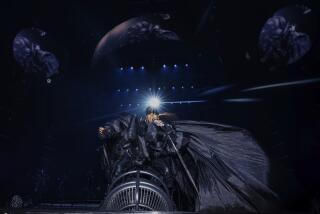A Cornucopia of Ella, Duke
- Share via
In 1966, the Duke Ellington Orchestra was in its last decade of glory. The personnel still included such legendary performers as saxophonists Johnny Hodges, Harry Carney, Paul Gonsalves, Jimmy Hamilton and Russell Procope; Cat Anderson and Cootie Williams were in the trumpet section; Lawrence Brown and Buster Cooper in the trombone section; and Sam Woodyard was anchoring the rhythm section on drums. It was, by almost any standard, one of the extraordinary musical aggregations in jazz history, approaching the close of its remarkable tenure.
Ella Fitzgerald, at the same time, was at the peak of her skills. Although her career was already filled to overflowing with professional and artistic accomplishments, her creativity remained undiminished, enhanced by a mature confidence in her craft.
Ellington and Fitzgerald had joined forces successfully in the past, most notably for the “Ellington Songbook” recording of 1957 and the “Ella at Duke’s Place” album of 1965. So when the opportunity arose to chronicle this vital musical partnership in a series of concerts in the South of France in mid-1966, the temptation was irresistible. And producer Norman Granz, who was also managing both artists, took advantage of the occasion by recording four consecutive nights of recordings in late July 1966 at Le Festival International de Jazz d’Antibes-Juan-les-Pins on the French Riviera.
Part of the material from the programs was originally available on a double LP, “Ella & Duke at the Cote d’Azur,” in 1967 (an Ellington instrumental-only collection, “Soul Call,” was also released at the same time). The double LP was expanded with additional tracks for a CD release in 1997. But Verve has now elected to release an eight-CD set of the entire collection of performances. Included are more than 90 tracks of concert appearances totaling more than eight hours of music. As an added bonus, there is a final, utterly fascinating CD devoted to a rehearsal session in which Ellington works through two new compositions with his orchestra.
It would be more accurate, however, to refer to the material on the other seven CDs as joint appearances rather than a partnership. The majority of the time is dominated by a series of sets by the Ellington orchestra, often performing repeated versions of the same music. Three of the CDS, for example, are completely devoted to Ellington. A fourth CD includes eight of 12 tracks, and a fifth CD, 11 of 16 tracks, by the Ellington orchestra without Fitzgerald.
Perhaps most important of all, Ellington is at the piano on just three of the 18 tunes Fitzgerald sings with the orchestra--two versions of “Cottontail” and a romp through “It Don’t Mean a Thing (If It Ain’t Got That Swing).” Finally, she sings a single piece, “Just Squeeze Me,” with a small ensemble that includes Ellington, Gonsalves and former Ellington stars Ben Webster and Ray Nance.
Essentially what this means is that the Fitzgerald tracks--aside from those sung with only her trio--use the Ellington orchestra strictly as accompanists, generally playing arrangements by her music director, pianist Jimmy Jones.
So what is the overall value of such a massive collection of material, especially given the large number of repeated performances of the same material? (There are, for example, no less than five renditions of “Things Ain’t What They Used to Be” by the orchestra, and Fitzgerald sings three versions of “Satin Doll” as well as multiple interpretations of “Thou Swell,” “Let’s Do It” and “So Danco Samba.” And the spoken introductions by Ellington and Fitzgerald for the multiple-versions tunes are often virtually identical.)
The answer is that the work of artists of this stature demands attention, especially when their powers are--as they are here--still extremely vital. And there is something especially insightful about hearing how they managed to maintain the level of those powers from night to night, from concert to concert. Traveling, constantly performing, generating creative energy no matter what the setting, was an essential part of life for Ellington and Fitzgerald. And here, over a four-night period, is a display of how well they did it.
True, and perhaps inevitably, there are flabby moments over the course of these performances. But there also are any number of exquisite passages, from Fitzgerald’s joyous improvising with Gonsalves on “Cottontail” and Hodges’ sensuous swirl through “Star Crossed Lovers” to the always-fascinating revivals of “Black and Tan Fantasy,” “Creole Love Call” and “The Mooche.” There are the opportunities to hear multiple versions of the extended “La Plus Belle Africaine” and selections from the rarely heard “Such Sweet Thunder” suite.
Budget-minded fans can get some of the essence of these dates in the two-CD Ellington-Fitzgerald Cote d’Azur set. But there’s no denying the appeal of the entire package, with its warts-and-all perspective on the everyday work of two illustrious performers in the prime of their creativity.
*
Albums are rated on a scale of one star (poor), two stars (fair), three stars (good) and four stars (excellent).
More to Read
The biggest entertainment stories
Get our big stories about Hollywood, film, television, music, arts, culture and more right in your inbox as soon as they publish.
You may occasionally receive promotional content from the Los Angeles Times.










